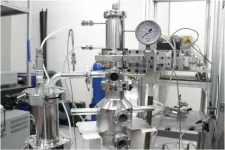(Press-News.org) Having a heart attack significantly increases the risk of developing other serious long-term health conditions, a major new study shows.
Researchers at the University of Leeds have analysed more than 145 million records covering every adult patient admitted to hospital over a nine-year period to establish the risk of long-term health outcomes following a heart attack – in the largest study of its kind.
Whilst heart attacks are a serious and life-threatening condition, the British Heart Foundation estimates that nowadays more than seven in 10 people survive them, provided they receive quick and emergency treatment to get the blood flowing to the heart muscle again. Yet previous research has shown that heart attacks can have health implications for patients including further conditions which affect the heart and circulatory system, but also conditions affecting other parts of the body and mental health conditions.
The new research, part funded by The British Heart Foundation and Wellcome, shows that patients who had a heart attack went on to develop further conditions at a much higher rate than people of the same age and sex who had not had one.
Up to a third of patients went on to develop heart or kidney failure, 7% had further heart attacks and 38% died from any cause within the nine-year study period.
Heart failure, atrial fibrillation, stroke, peripheral arterial disease, severe bleeding, kidney failure, type 2 diabetes and depression all occurred more frequently for people who had a heart attack compared with those who did not; but the risk of cancer was lower overall, and the risk of dementia did not differ overall.
The study also identified that people from more socioeconomically deprived backgrounds were more likely to die or develop serious long-term health conditions following a heart attack. In particular, those from more deprived backgrounds were more likely to develop heart and kidney failure, compared to people from less deprived backgrounds of a similar age.
Lead author Dr Marlous Hall, Associate Professor of Cardiovascular Epidemiology in Leeds’ School of Medicine and Multimorbidity Research in the Leeds Institute for Data Analytics (LIDA), said: “There are around 1.4 million heart attack survivors in the UK who are at high risk of developing further serious health conditions. Our study provides accessible online information of the risk of these health outcomes for specific age, sex and socioeconomic deprivation groups so that individuals surviving a heart attack can be well informed about their future risks, in order to support informed healthcare decision making with their doctor.
“Effective communication of the likely course of disease and risk of adverse long-term outcomes between patients and healthcare professionals can promote positive lifestyle changes, encourage patients to stick to treatment, and improve patient understanding and quality of life.”
“Our study highlights the need for individual care plans to be revised to take into account the higher demand for care caused by survivorship.”
The researchers analysed the records of all individuals aged 18 years and over, who were admitted to one of 229 NHS Trusts in England between 1 January 2008 and 31 January, 2017. This amounted to 145,912,852 hospitalisations among 34,116,257 individuals. There were 433,361 reports of people who had a heart attack for the first time. The average age of heart attack patients was 67 years, and 66% of patients were male.
The study looked at 11 non-fatal health outcomes detailed below, plus death from any cause, and compared the results to a control group of 2,001,310 individuals.
Health outcomes
The research showed a significantly increased risk of developing some conditions following a heart attack, when compared to the control group of patients.
Most likely was heart failure, with 29.6% of the study group going on to develop the condition within nine years of their heart attack, compared with 9.8% of the control group over the same time frame.
Kidney failure developed in 27.2% of the patients in the study group, compared with 19.8% of the control group.
Some 22.3% of the study group went on to develop atrial fibrillation, compared with 16.8% of the control group.
And new hospitalisation for diabetes was seen in 17% of the study group, compared with 14.3% of the control group.
Other conditions were:
Severe bleeding - Study group: 19%; Control group: 18.4%
Cerebrovascular disease - Study group: 12.5%; Control group: 11.6%
Peripheral arterial disease - Study group: 6.5%; Control group: 4.06%
Death from any cause - Study group: 37.8%; Control group: 35.3%
Overall, hospitalisation records indicating depression occurred in 8.9% of people after a heart attack – which was 6% more likely following a heart attack than in the control group. Women were more likely to develop depression after a heart attack than men, especially those who had their heart attack at a younger age. 21.5% of women who were under the age of 40 at the time of their heart attack had hospitalisation records for depression compared with 11.5% of men in the same age category.
There was no overall difference in the risk of dementia following a heart attack compared with the control group. Whilst the risk of vascular dementia was more likely in the study group, the difference observed was small (study group 2.3%; control group 2.1%).
In contrast with other health outcomes the research showed that cancer was less pronounced in the study group than in the control group. Some 13.5% of the study group went on to develop cancer after their heart attack, but this compared with 21.5% of the control group. Researchers believe there are likely many factors affecting this finding but the specific reasons for fewer cancers after a heart attack remain unclear and require further investigation.
Morag Foreman, Head of Discovery Researchers at Wellcome, said: “This research provides valuable insight into the types of support and interventions that may be needed for patients following a heart attack, helping both doctors and patients make informed decisions during recovery and beyond."
“This research shows how cohort studies and analysis of large data sets can further our understanding of key health challenges and demonstrates the value to supporting discovery research in the field of population and public health. As survival rates following a heart attack improve, understanding the longer-term impacts on physical and mental health is crucial."
Professor Bryan Williams, Chief Scientific and Medical Officer at the British Heart Foundation, said: “While more people than ever are surviving heart attacks, there can be longer term consequences. Particularly after a major heart attack, people can be left with irreparable damage to their heart, putting them at increased risk of heart failure.
“This study sheds further light on how heart attacks are associated with increased risk of developing other serious health conditions, including heart failure and atrial fibrillation. It also found that those from more socioeconomically deprived backgrounds are at greater risk of further ill health after a heart attack, and at a younger age. The research suggests that these patients may benefit from additional support and monitoring to help reduce their risk of developing further health conditions.
“It is vital NHS has the resource, including staff, infrastructure and equipment, to deliver the care that patients need to help them stay in the best possible health for longer.”
Further information
“Health outcomes after myocardial infarction: a population study of 56 million people in England” is published in PLOS Medicine on Thursday 15 February at 19:00 UK time.
Further resources are available on the study website.
Email University of Leeds press officer Lauren Ballinger on l.ballinger@leeds.ac.uk with media enquiries.
University of Leeds
The University of Leeds is one of the largest higher education institutions in the UK, with more than 38,000 students from more than 150 different countries. We are renowned globally for the quality of our teaching and research.
We are a values-driven university, and we harness our expertise in research and education to help shape a better future for humanity, working through collaboration to tackle inequalities, achieve societal impact and drive change.
The University is a member of the Russell Group of research-intensive universities, and plays a significant role in the Turing, Rosalind Franklin and Royce Institutes. www.leeds.ac.uk
Follow University of Leeds or tag us in to coverage: Twitter | Facebook | LinkedIn | Instagram
About the British Heart Foundation
It is only with donations from the public that the BHF can keep its life saving research going. Help us turn science fiction into reality. With donations from the public, the BHF funds ground-breaking research that will get us closer than ever to a world free from the fear of heart and circulatory diseases. A world where broken hearts are mended, where millions more people survive a heart attack, where the number of people dying from or disabled by a stroke is slashed in half. A world where people affected by heart and circulatory diseases get the support they need. And a world of cures and treatments we can’t even imagine today. Find out more at bhf.org.uk
About Wellcome
Wellcome supports science to solve the urgent health challenges facing everyone. We support discovery research into life, health and wellbeing, and we’re taking on three worldwide health challenges: mental health, infectious disease and climate and health.
END
Heart attack significantly increases risk of other health conditions
2024-02-16
ELSE PRESS RELEASES FROM THIS DATE:
Plasma technology for more effective lithium extraction
2024-02-16
New research suggesting a improved method for extracting lithium by applying plasma technology has been recently published.
On the 31st of January, the Korea Institute of Fusion Energy(KFE) announced revealed that their researchers have successfully increased the lithium extraction rate by three times compared to pre-existing methods by applying CO2 microwave plasma technology.
The most common method of extracting lithium is mixing sodium carbonate(Na2CO3) to saltwater that contains lithium and extracting lithium carbonate(Li2CO3)-which is a mixture of lithium and carbon dioxide. The downside to this method ...
Can astronomers use radar to spot a cataclysmic asteroid?
2024-02-16
How can humans protect the Earth from “devastating asteroid and comet impacts?” According to the National Academies and their 2023-2032 Planetary Science and Astrobiology Decadal Survey, ground based astronomical radar systems will have a “unique role” to play in planetary defense.
There is currently only one system in the world concentrating on these efforts, NASA’s Goldstone Solar System Radar, part of the Deep Space Network (DSN). However, a new instrument concept from the National Radio Astronomy Observatory ...
Self-monitoring improves physical activity of care-needing elderly
2024-02-16
Self-monitoring of physical activity with an accelerometer and feedback is an effective tool to improve physical activity in elderly people requiring long-term support. The Kobe University study is the first to show that with simple and safe means the physical activity of this demographic can be improved, which is expected to help prevent serious illness and reduce costs for long-term care.
Taking more steps and sitting less is well known as having a significant influence on a wide range of noncommunicable diseases such as heart disease, diabetes, orthopedic diseases and stroke. This is particularly problematic in senior citizens who depend on long-term care such as in day-care ...
WVU close to commercializing microwave technology that can cool down industry’s energy usage
2024-02-16
West Virginia University engineers have secured $3 million in U.S. Department of Energy funding to research a new chemical reactor system that uses microwaves to reduce industrial heat and carbon emissions.
The first-of-its-kind technology would allow industrial facilities to simultaneously produce ethylene and ammonia, two chemicals that contribute significantly to greenhouse gas emissions, within a single microwave reactor. That device uses heat from microwave electromagnetic radiation to carry out chemical reactions.
The ...
New Issue of GEN Biotechnology
2024-02-16
GEN Biotechnology announces the publication of its February 2024 issue. GEN Biotechnology publishes outstanding peer-reviewed research and perspectives in all aspects of biotechnology. The Journal, led by Editor-in-Chief Hana El-Samad, PhD (UCSF; Altos Labs) and Executive Editor Kevin Davies, PhD, is published bimonthly in print and online.
For full-text copies of articles or to arrange interviews with Dr. El-Samad, Dr. Davies, authors, or members of the editorial board, contact Kathryn Ryan at the Publisher.
1. Original Research: ...
New chip opens door to AI computing at light speed
2024-02-16
Penn Engineers have developed a new chip that uses light waves, rather than electricity, to perform the complex math essential to training AI. The chip has the potential to radically accelerate the processing speed of computers while also reducing their energy consumption.
The silicon-photonic (SiPh) chip’s design is the first to bring together Benjamin Franklin Medal Laureate and H. Nedwill Ramsey Professor Nader Engheta’s pioneering research in manipulating materials at the nanoscale to perform mathematical computations using light ...
Study shows impact of antidepressants on fetal brain development during pregnancy
2024-02-16
A new study published in Nature Communications provides direct evidence that antidepressant use during pregnancy can impact a child’s brain development and contribute to the risk of mental health disorders later in life.
The study, led by researchers at the University of Colorado Anschutz Medical Campus, focused on the effect of fluoxetine, commonly used in medications such as Prozac and Sarafem for treating depression and perinatal depression, on a developing prefrontal cortex.
Since fluoxetine works by increasing the levels of serotonin in the brain, the researchers looked at the impact serotonin has on prefrontal ...
First human trial shows ‘wonder’ material can be developed safely
2024-02-16
A revolutionary nanomaterial with huge potential to tackle multiple global challenges could be developed further without acute risk to human health, research suggests.
Carefully controlled inhalation of a specific type of graphene – the world’s thinnest, super strong and super flexible material – has no short-term adverse effects on lung or cardiovascular function, the study shows.
The first controlled exposure clinical trial in people was carried out using thin, ultra-pure ...
Towards more efficient catalysts
2024-02-16
Researchers from the Harvard John A. Paulson School of Engineering and Applied Sciences (SEAS), Harvard Department of Chemistry & Chemical Biology, and Utrecht University have reported on a previously elusive way to improve the selectivity of catalytic reactions, adding a new method of increasing the efficacy of catalysts for a potentially wide range of applications in various industries including pharmaceuticals, cosmetics and much more.
The research is published in ...
Laboratory study on conditions for spontaneous excitation of "chorus emission," wave of space plasma
2024-02-16
A dipole magnetic field, created by a ring current, is the most fundamental type of magnetic field that is found both in laboratories and in space. Planetary magnetospheres, such as Jupiter's, effectively confine plasma. The RT-1 project aims to learn from nature and create a magnetosphere-type high-performance plasma to realize advanced fusion energy. Simultaneously, the artificial magnetosphere offers a means to experimentally understand the mechanisms of natural phenomena in a simplified and controlled ...





